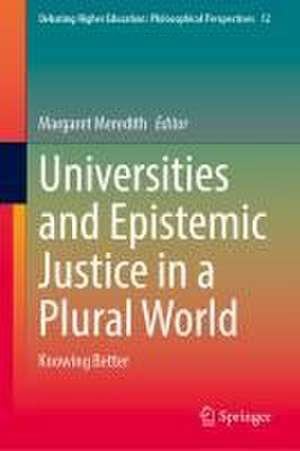Universities and Epistemic Justice in a Plural World: Knowing Better: Debating Higher Education: Philosophical Perspectives, cartea 12
Editat de Margaret Meredithen Limba Engleză Hardback – 27 feb 2024
Contributions are included from authors working in varied disciplinary and cultural contexts in universities, who describe and explicate their work towards identifying epistemic injustice and finding spaces to advance knowledge justice in theory and in practice. The book will be beneficial to academics and those with an interest in the role of universities in serving the public good.
Preț: 783.20 lei
Preț vechi: 955.11 lei
-18% Nou
Puncte Express: 1175
Preț estimativ în valută:
149.87€ • 156.87$ • 124.74£
149.87€ • 156.87$ • 124.74£
Carte tipărită la comandă
Livrare economică 31 martie-14 aprilie
Preluare comenzi: 021 569.72.76
Specificații
ISBN-13: 9789819998517
ISBN-10: 9819998514
Pagini: 199
Ilustrații: XI, 199 p. 1 illus.
Dimensiuni: 155 x 235 mm
Greutate: 0.48 kg
Ediția:2024
Editura: Springer Nature Singapore
Colecția Springer
Seria Debating Higher Education: Philosophical Perspectives
Locul publicării:Singapore, Singapore
ISBN-10: 9819998514
Pagini: 199
Ilustrații: XI, 199 p. 1 illus.
Dimensiuni: 155 x 235 mm
Greutate: 0.48 kg
Ediția:2024
Editura: Springer Nature Singapore
Colecția Springer
Seria Debating Higher Education: Philosophical Perspectives
Locul publicării:Singapore, Singapore
Cuprins
Acknowledgements.- Chapter 1. Introduction (Margaret Meredith).- Part I: Knowledge and Justice in Higher Education.- Chapter 2. Who and What are Universities for? (Margaret Meredith).- Chapter 3. Approaches to Epistemic Justice (Margaret Meredith).- Chapter 4. Knowledge in the University (Margaret Meredith).- Part II: Epistemic Justice in Curriculum, Pedagogy and Assessment.- Introduction to Part II.- Chapter 5. Art, Prejudice and Privilege: Disciplinary Elitism, Students from Working-Class Communities and Epistemic Justice (Vanessa Corby).- Chapter 6. Rural Students and Science: Curricular Justice, Epistemic Justice and Epistemic Freedom Nkosinathi (Emmanuel Madondo).- Chapter 7. Epistemic Justice in Classroom Dialogues: Coming to Know the ‘Other’ with Non-Western Epistemological Lenses (Noriyuki Inoue).- Chapter 8. Beyond Epistemic Boundaries: International Students and Educational Leadership in its Cultural Complexity (Bev Rogers).- Chapter 9. Epistemic Justice and Authentic Assessment (Jan McArthur).- Part III: Research and Epistemic Justice.- Introduction to Part III.- Chapter 10. Wâhkôhtowin (a Kinship) of the Indigenous Episteme, Circlework and Epistemic Justice in Indigenous Research (Margaret Kovach and Laurel Forshaw).- Chapter 11. Hermeneutical Justice in an International Erasmus Mundus Research Project (Catalina Quiroz-Niño, Margaret Meredith and Ana María Villafuerte Pezo).- Chapter 12. Weaving Words: Dialogue between the Academy and the Community (Donatila Ferrada and Miguel Del Pino).- Chapter 13. Conclusion Knowing Better: The Challenge for Universities (Margaret Meredith).- Index.
Notă biografică
Margaret Meredith has 20 years of experience as a senior lecturer in education departments in higher education in the UK and currently works at York St John University. Her current responsibilities include teaching and leadership on doctorate and master’s degree programmes. Prior to that she worked in the third/social sector as a youth worker, and for eight years was a primary school teacher in the UK and abroad.
She has co-written and co-coordinated a three-year international and multi-disciplinary Erasmus Mundus project which involved working with academics and practitioners to develop a handbook about the epistemologies, values and practices in the social economy. Her PhD drew on the experiences of co-ordinating the project using action research methodology to develop her own understanding and practices of participation and inclusion in the domain of knowledge in higher education.
She has co-written and co-coordinated a three-year international and multi-disciplinary Erasmus Mundus project which involved working with academics and practitioners to develop a handbook about the epistemologies, values and practices in the social economy. Her PhD drew on the experiences of co-ordinating the project using action research methodology to develop her own understanding and practices of participation and inclusion in the domain of knowledge in higher education.
Textul de pe ultima copertă
This book explains why universities, and academics within them, must engage with the diversity of knowledges and knowers that exist in the world. Through philosophical perspectives, theoretical frameworks and practical examples from around the world, the book searches for opportunities for renewal and inclusion in universities. It explains how higher education can better serve the purposes of social justice by re-evaluating the types of knowledge it promotes. Going beyond the identification and analysis of injustices in ways of knowing in academia, the book offers insights and examples of practices in teaching, research and work with the community which aim to move towards justice on an epistemic level. It argues that inclusion in the domain of knowledge can lead to the generation of knowledges and understandings that are more robust and better equipped to address the pressing needs of the plural worlds outside the university.
Contributions are included from authors working in varied disciplinary and cultural contexts in universities, who describe and explicate their work towards identifying epistemic injustice and finding spaces to advance knowledge justice in theory and in practice. The book will be beneficial to academics and those with an interest in the role of universities in serving the public good.
Contributions are included from authors working in varied disciplinary and cultural contexts in universities, who describe and explicate their work towards identifying epistemic injustice and finding spaces to advance knowledge justice in theory and in practice. The book will be beneficial to academics and those with an interest in the role of universities in serving the public good.
Caracteristici
Provides a comprehensive approach to the theme of knowledge justice in higher education Informs theoretical explanations of academic practice towards knowledge justice Approaches teaching, learning and research in varied local and international contexts












